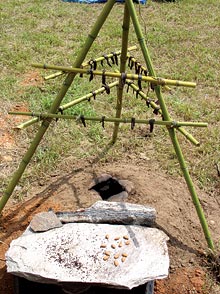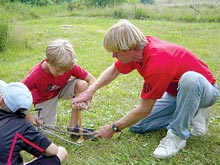Who knows when a country drive or backwoods day hike might suddenly turn into a multi-day ordeal? It’s one of those scenarios that most of us never really think about before heading out into the woods. But if you walk on the wild side often enough, sooner or later you’re bound to get lost. And with the arrival of winter, any one of us could wind up stranded in the unforgiving cold, paying karma one slow, hypothermic tear at a time—unless we learn how to rough it the way our ancestors did.

“The best thing to do when you find yourself lost or stranded in the woods is to admit it. Your mind can be your best friend or worst enemy,” advises Richard Cleveland, who owns the Earth School in Tryon, N.C. (www.lovetheearth.com). “Stop, think, observe and plan. Consider the survival rule of threes: One can survive for only three minutes without oxygen, three hours without insulation from extreme cold, three days without water, and three weeks without food.” So if it looks as though you might be spending some time in the woods waiting for rescue, the first thing to do is make a shelter to stay warm.
It could be as simple as raking leaves and debris into a huge pile, Cleveland explains, the way most of us did as kids. Then find some solid branches to push into the pile to give it some structure. Even in a rainstorm, you’ll probably stay dry in there. Before wiggling in (being careful to aim for the middle of the pile, so the ground doesn’t steal your heat) you can even stuff leaves inside your shirt and pants for added insulation.
Thirsty yet? Since it’s extremely unlikely that there’s a huge saguaro cactus walking around these parts waiting to share its life-giving liquid with you, it’s time for some “out of the pail” thinking to conjure your own H2O. After a rain or morning dew, take a piece of absorbent cloth—a sock will do—and sponge up water from the surrounding foliage. Wring the makeshift rag over a container till it’s full.
No container? No problem. Find a tree stump or piece of a log and carve out a basin. Better yet, get a fire going, pull coals from it and lay them on the wood. After they’ve burned into it and cooled, scrape away the char. Repeat until you have a bowl. If you’re without your trusty Swiss Army knife, there are plenty of rocks in our area, such as quartz, that can be banged together skillfully to produce razor-sharp flakes big enough to serve as carving tools.
Maybe there’s a stream or lake nearby, but it’s probably contaminated with giardia or some other gut-torturing parasite. First, collect some water in your new bowl. Grab a few rocks—not from the water, as they’ll explode when heated—and set them in the fire till they’re red-hot. Then place them in the bowl and wait.

No lighter or matches, you say? That ups the ante considerably; Cleveland calls making fire a humbling experience. First, look around for some highly flammable material—pocket lint, the feathery fluff found on thistle, shavings of tulip-tree bark etc.—to make a tinder bundle. You’ll also need a flexible stick several feet long to serve as a bow, some cord (which can be made from twisted bark or plant fiber), a fireboard, spindle (pointed stick) and handle (a rock or lump of wood). Tie the cord to the ends of the bow (preferably notching them to hold it in place) and tighten until the bow is slightly bent and the string is taut. After carving a notch into the fireboard, place the spindle point in the notch and loop the bowstring around the spindle. Use the handle to hold the spindle upright with your free hand. Move the bow back and forth to spin the drill, pressing down on the handle to create friction between the drill point and the notch. Smoke and dust whirl in the hole, and eventually a glowing ember is born. Place it in the tinder bundle and blow. Once the bundle is aflame, slip it into a nexus of stacked sticks (pyramid or box style); hopefully, it will take off from there.
All that work can awaken a savage hunger, but there are dozens of ways to scrounge up a meal in the wild. Trapping for mice (which Cleveland says taste like hot dogs roasted about 10 times too long) and foraging for wild edibles (dandelion, certain fungi, roots etc.) are easy meals.
Natalie Bogwalker of Wildroots (www.wildroots.org), an off-the-grid, primitive-living community just north of Asheville, takes a different tack. “We pick up roadkill when it’s fresh. If the hair pulls out of the skin, if it smells, or if the weather is warm—it’s probably bad. Deer, rabbit, raccoon, possum, squirrels are all good to eat.”
But it’s important to clean it quickly, lest the stomach bacteria get out of control and spoil the meat. Still, Bogwalker reports, “The only thing I’ve gotten sick from is old rice.”
For some people, practicing primitive-living skills becomes a way of life. “What seems extreme at first becomes easy with time,” she notes. “If I sleep three nights with no fire and few blankets in the wintertime, I can walk around in a T-shirt on a 35-degree day. I am happy living without running water, refrigeration or electricity. Humans are incredibly adaptable creatures. The conveniences of modern life have only become common within the last 100 years. It’s ironic that many can’t imagine their lives without them,” says Bogwalker.
Zev Friedman routinely gets out in the woods to practice his primitive-living skills. On a 30-mile walk along the river over several days, Friedman and friends made it a point to rely solely on nature’s bounty, eating fish, kudzu, Indian cucumbers, nettles, dandelions, elderberries, willow root and greens. “These skills are part of my daily life,” he says. “Life is just better living closer to the earth.”
But before you run off into the woods, remember: There are no “Caution, I’m Deadly” signs on plants, mushrooms, frigid nights, bears etc.
“People always overestimate their ability,” says Asheville resident Dawn Drusin, a primitive-skills student who formerly worked with Colorado Search and Rescue. “Make it a point to at least know the basics.”
[Jonathan Poston can be reached at www.prnut.com]



Before you comment
The comments section is here to provide a platform for civil dialogue on the issues we face together as a local community. Xpress is committed to offering this platform for all voices, but when the tone of the discussion gets nasty or strays off topic, we believe many people choose not to participate. Xpress editors are determined to moderate comments to ensure a constructive interchange is maintained. All comments judged not to be in keeping with the spirit of civil discourse will be removed and repeat violators will be banned. See here for our terms of service. Thank you for being part of this effort to promote respectful discussion.